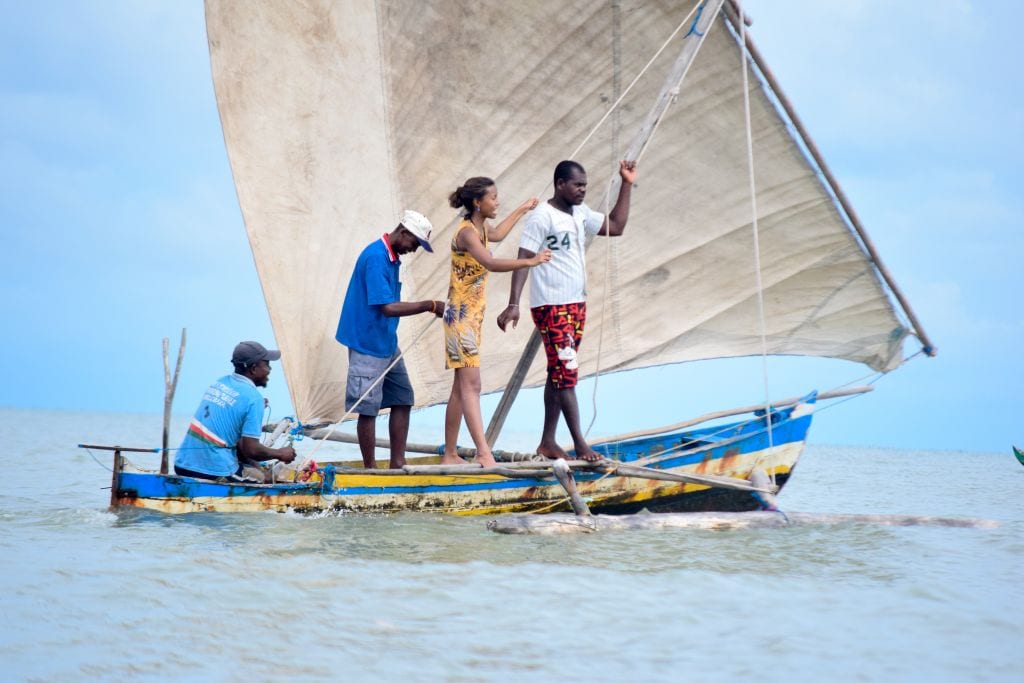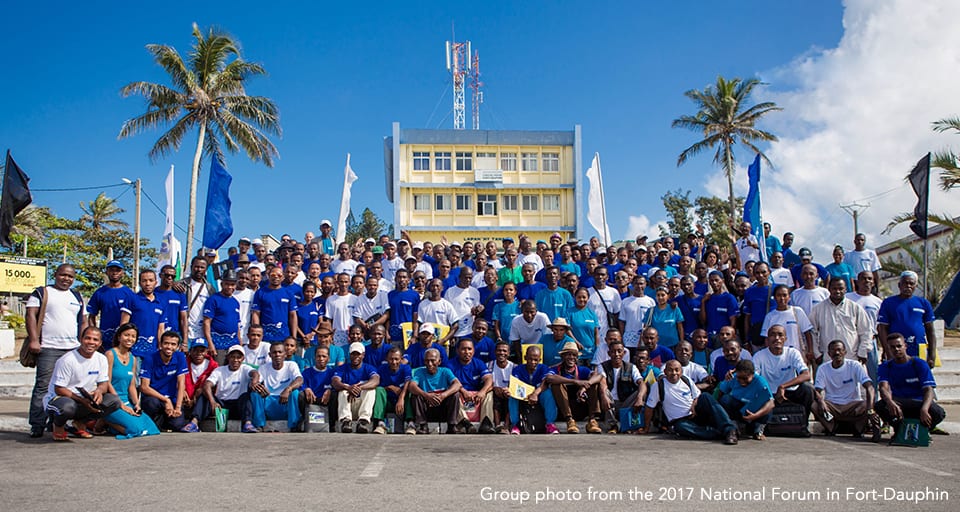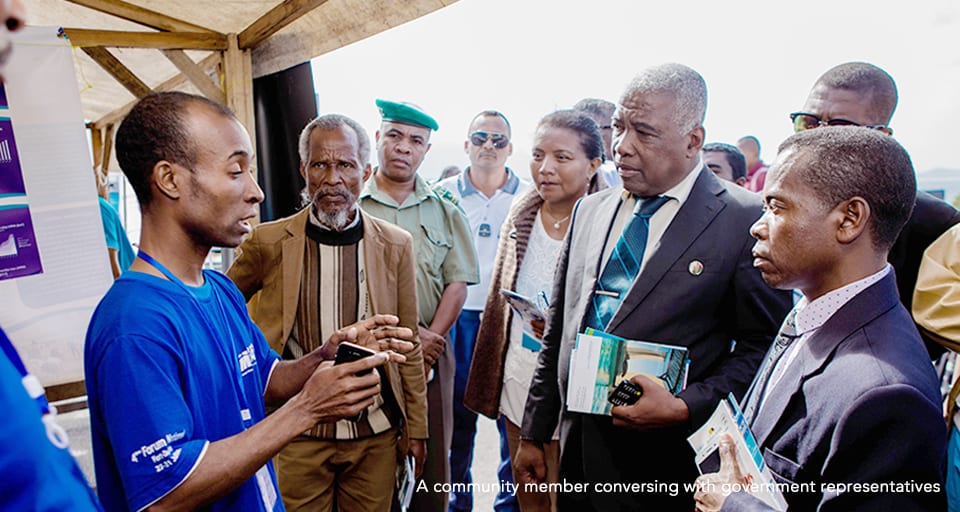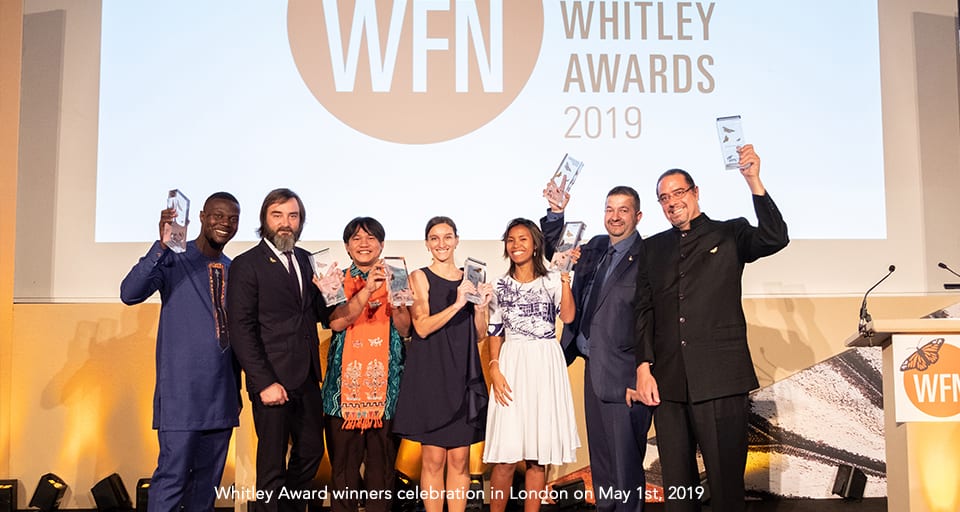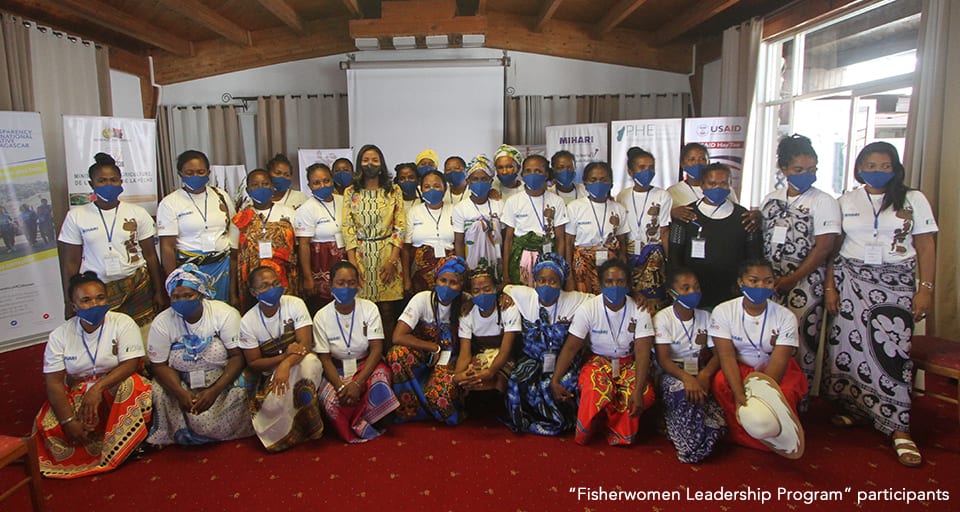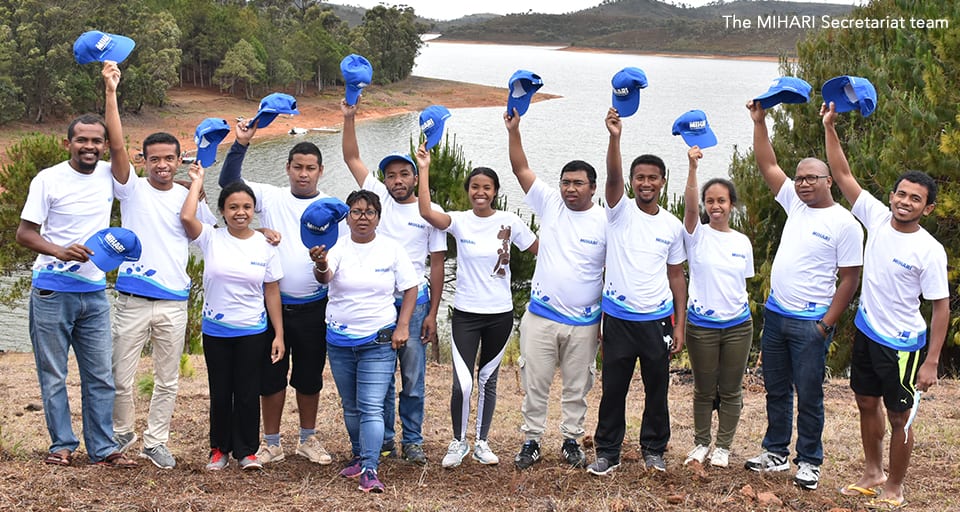Hello everyone, my name is Vatosoa Rakotondrazafy and today, the 6th of November is my last day as the National Coordinator with MIHARI. I have spent nearly 6 amazing years working with MIHARI, years that have truly marked me as an individual. It has been an incredible ride for which I am very thankful for. When I began in January 2015, there were only a small number of LMMA communities and NGO partners involved with the network, and very few people even knew what MIHARI was, or what it did. We’ve gone a long way and I am proud of what we have done together. I leave today with a thankful heart and knowing that MIHARI has become known not just throughout Madagascar, but around the world!
We’ve gone a long way and I am proud of what we have done together.
I still remember so clearly the day I saw the job advertisement for this position. I was in Vancouver, Canada studying at the University of British Columbia while I was researching on sustainable fisheries in Madagascar. I was struggling with a profound life question: whether to stay in Canada and get professional experience internationally, or return home and contribute my skills in serving to my country and people. I had spent most of my research time reading about fishing in Madagascar, yet somehow I had never heard of this special network. I searched the internet for information on MIHARI but could not find much about it, nor on LMMAs. Nevertheless, I dragged myself out of bed for my interview at 6am on the morning of December 10th, 2014 for which ended up super energizing me. I then returned to my native home of Madagascar and on January 27th, 2015 I began my adventure with MIHARI. I have never looked back and have never been happier.
I joined MIHARI as the first and only staff member. Today, I work with an amazing team of 13 staff, 25 NGO members, and 219 LMMA communities. Together, with MIHARI, we have come together, we have made noise, garnished attention, and made many, many friends in government and the private sector. Together, we have become known and listened to. Together, we have made impacts!
Today, I am leaving my position as National Coordinator. I will be joining a new organization that works to mobilize the collective assets of all stakeholders to amplify and elevate a national movement to restore Madagascar’s marine and terrestrial landscapes, re-green the island, and fight air pollution in the country. However, I am excited to announce that I will stay with you in a volunteer capacity as the new President of MIHARI’s Board of Trustees. It was not an easy decision to make, but the many messages I received from communities and network members have encouraged me to continue to take on this new role. I am proud that the community I have worked with for so many years continues to entrust me to partner with them in the next phase of MIHARI’s work, and I thank them for nominating me and electing me. The position of President is one I take very seriously: it offers a chance to ensure the Board continues to function effectively and fulfils its responsibilities in supporting the MIHARI network to help continue to work towards a better world for fisherfolk across Madagascar. I'll be in this role for one year until the next election takes place. I see it as a wonderful opportunity to ensure consistency and capacity exchange with the new leadership of MIHARI.
Together, we have become known and listened to. Together, we have made impacts!
However, I still want to take the occasion to say thank you for this adventure, to share with you some of the most crucial insights I have gained over my tenure as National Coordinator at MIHARI so the next leaders build upon our successes and further overcome future obstacles that arise.
When I began at MIHARI, National Forums were already a part of our network’s impact, but I knew that in order to transform this network into a movement, these National Forums would have to be at the forefront of that effort. Knowing each other, working together, problem solving, co-creating – these are the essential elements that bring together a community. Our National and Regional Fora have allowed us to do this. There have now been more than ten of the critical engagement moments. At each of these events, we have brought together 200-300 individuals from communities, NGOs, government, and the private sectors, we helped create spaces to get a shared understanding of needs, goals, and expectations. From these Fora we co-created a National Strategy; we took on and worked toward establishing reserved areas for small-scale fishers; we made Madagascar aware of the importance of small scale fishing, the power of Locally Managed Marine Areas, and created critical positive relations with our essential partners in government.
By providing this mechanism for fishers to come together, we have transformed these National Forums from an information sharing space to a process for co-creation filled with trust, and in turn, ensured the growth and success of MIHARI as a powerful and influential network. I look forward to coming to many more forums in the future to see how MIHARI continues to grow. In the age of COVID-19, we may need to reinvent the format of our National and Regional Forums. We will need to recreate the way we work together at all levels. This will be an essential part of the next year and I look forward to working with the MIHARI team and members to ensure we all remain safe and prosperous.
We have transformed these National Forums from an information sharing space to a process for co-creation filled with trust, and in turn, ensured the growth and success of MIHARI as a powerful and influential network.
We all created MIHARI to support community fishers, but in doing so, we also established one of the best collaborative spaces for fisheries in Madagascar, bringing together partners and other organisations and ensuring they know about our work. MIHARI is a network, and thus the lessons learned must involve as many stakeholders as possible from government, donors, partners, and the private sector. Nothing is more isolated than one fishing boat out a sea. However, we have seen that when we work together, we can raise our voices and that we can be heard. Our gatherings have made it possible for so many to be supportive. There are many who now share our beliefs, our hopes and have found in MIHARI a way to be included and engaged in supporting sustainable fishing and community development. It has been incredible to watch over the last five years as many different organizations, fishers, NGOs, government departments have come together, got to know each other, grown together, and created together.
So yes, I have learnt to love and trust the power of the network. However, above all, I believe we succeeded because of our trust in the fishers themselves. I have often heard that we need to support them, teach them, and speak for them. For me, this misses the real reason MIHARI was successful, which was because we ignored these stereotypes and listened to fishers. From day one, we treated fisherfolk as they deserve to be treated – as the experts they are. I am constantly amazed by their insights, and while I have a Master’s degree and most of them do not, I continuously learn from them every time we speak. They have so much to teach us about our ecosystems and the interconnectivity of biodiversity. We must remember that we are serving them: they have been my boss, they are my collaborators, and I respect their expertise over everything else. For MIHARI to continue to grow, it must be grounded on this respect and understanding.
With this respect in fisherfolks, came a critical dimension of MIHARI’s success. We realized we as MIHARI staff do not need to be the experts, the teachers, the spokespersons. We can just be the facilitators, the enablers. We learnt to step back, not step up. We recognized that communications usually goes better when it occurs between fishers, not imposed by other organizations. Fishers share common challenges and have overcome them, and thus often know the answers. However, fishers can be shy given that we’re in a society that has not made them feel valued. I am proud that MIHARI has created a platform to build trust and understanding. Through formal and informal training on communications, we have helped amplify the confidence and voice of fisherfolks. I smile often now as I sit at high level meetings with NGOs, donors and government officials when a once quiet fisher that is speaking up and is sharing their thoughts and concerns, proposes solutions and advising us.
One of the most special moments I had with MIHARI was receiving the Whitley Award in 2019. As I was handed the award and felt its weight in my hands. I knew I was accepting this prestigious award on behalf of all of the MIHARI family, on behalf of all of you who have championed the lives of Malagasy fishers, and the men and women who spend their everyday helping feed their families and their communities while keeping Madagascar shores and waters healthy, beautiful and fecund.
We recognized that communications usually goes better when it occurs between fishers, not imposed by other organizations.
I am not naïve. I leave knowing there is still much much work to be done. MIHARI as a network must still support all small-scale fisheries to adapt LMMA techniques and respect fisheries closures. It is important for the network to support more education and awareness activities at the local level. We do have a database of LMMAs, but we must update it regularly and ensure that it is shared broadly so that continued action and support occurs.
As the only woman on the MIHARI staff until 2018, leading a network largely made up of men and hosting National Forums where the vast majority of participants were men, I have often been questioned on the role of women in sustainable fishing in Madagascar. This is another area that still needs much work and the full support of the MIHARI network. I have asked the few women at our forums why they don’t speak up, and they bashfully confess that they question whether their opinions are valid and that they believe they ought to let the men speak. MIHARI has started to respond by launching on October 15th of this year the “FisherWomen Leadership program” that brought together 28 fisherwomen from all coastal regions of Madagascar, providing these women with professional development, capacity, confidence, and leadership building opportunities. Likewise, I encourage the next leadership of MIHARI to continue and deepen this important work. Women play an incredible role in creating a sustainable fishing regime.
I have never felt uncomfortable in my role due to my gender – I am a woman, and have always been the youngest in the room, but I know that I am respected. I am respected, because I respect them, the fishers, and value them as individuals and partners. We fish together, because I know how important it is to understand where they are coming from and their experiences and challenges firsthand. So whenever we are together boating in the sea, I am always ready to jump in. Let us embrace all women as the network has embraced me. In diversity, we have strengthened and enhanced learning.
Women play an incredible role in creating a sustainable fishing regime.
I will close by saying some important thank you offerings.
-First, thank you to other communities around the world, like Fiji, who helped introduce us to the power of community led fishing and LMMAs. We always grow stronger on the backs of other’s learning.
-To my incredible team – it has been a joy and honor to work with you.
-To our many donors and partners – you have made a great investment in something special: keep it up.
-To our marvellous group of NGO partners – a special thank you. We have only succeeded because of a culture of non-competition that exists here in Madagascar. This is surprisingly unique in the world and your gracious collaboration has lifted the lives of fisherfolks.
-And especially to our government who supported MIHARI since its start.
As the President of the board, I am committed to working with the team and members to ensure our wonderful Madagascar successes and learning are shared around the global - to benefit fisherfolks everywhere. Sharing our model, our approaches, our challenges - and how we overcame them is an important element of the future of MIHARI, and I look forward to supporting this work.
You have changed me forever.
Thank you to the thousands of fisherfolks I have the honor to be associated with over these years. You have changed me forever. You have made me a better person, more grounded, more courageous, more humble, more realistic, more empathetic, and more gracious. You have opened my mind and my heart. You have given me gifts I can never repay – but will spend a lifetime trying to share with others.
Veloma mandram-pihaona!
To contact me personally, please use vatosoa7421[at]gmail.com
Vatosoa Rakotondrazafy

